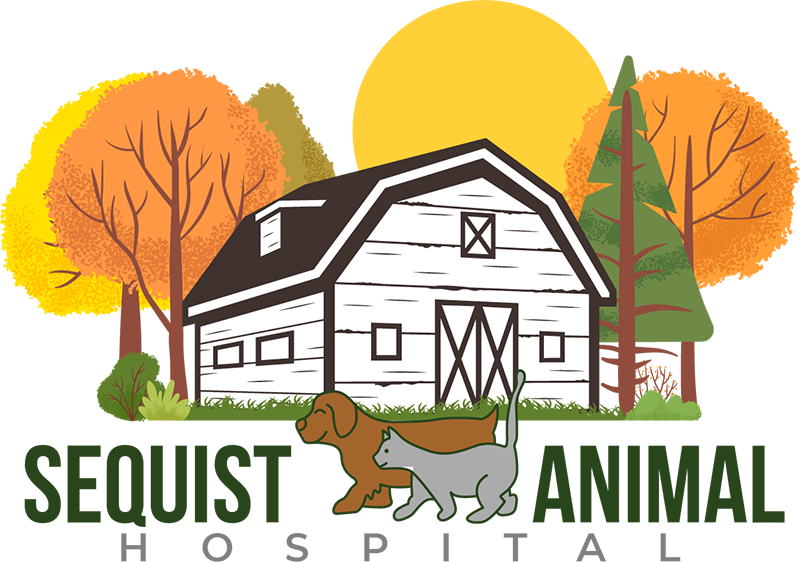Veterinary FAQs
We proudly serve the pets of Morrisville, VT and beyond.
At Sequist Animal Hospital, we get a ton of interesting questions from pet parents. Below are some common FAQs that might help answer any questions or concerns. Please feel free to call us at 802-888-7776 for any other concerns you might have about your pet.
Why was I asked to bring in a fresh fecal sample?
We recommend testing a fecal sample from each pet on a yearly basis to check for internal parasites. Most of the internal parasites that we find on animals are too small to be seen in the feces. Also, pets are not necessarily having diarrhea or losing weight as a result of these parasites.
Last, some of the parasites that we screen for are zoonotic, which means that they can be contagious to people as well as the other animals in the household. So, checking for internal parasites is a great way to keep both you and your pet healthy.
What will be examined during my pet’s yearly check-up?
The annual examination includes a tip-to-tail review of your pet. We examine the entire body to assess the health of your pet. We check the mouth to see if periodontal disease is present (which is an infection that can affect the heart, liver, and kidneys), ensure that your pet is the appropriate weight, listen to the heart and lungs, look for signs of infection and also ensure that your pet is moving normally.
This is a great opportunity to talk about any changes that may have occurred in the last year – some animals will have developed lumps/bumps that we will assess. It is also a great opportunity to see if other testing may be appropriate for your pet.
What vaccines does my pet really need?
Necessary vaccinations vary from pet to pet. We take into consideration the lifestyle, age, and health status of every animal before developing a vaccine protocol.
Will I have time to ask questions?
Of course! If you are able, please be prepared with any questions or concerns you may have. We will be happy to address them during your appointment.
Is antifreeze bad for your pet?
Antifreeze (ethylene glycol) is extraordinarily poisonous to both humans and our pets. A very small amount can be very dangerous to any pet. Antifreeze is especially difficult because it both smells and tastes sweet. If you believe your pet has ingested any amount of antifreeze, please call immediately.
What should I do about fleas & ticks?
These nasty pests are quite common in our area and can be harmful to your pet. Flea bites are very irritating to your pet’s skin and cause them to scratch and gnaw at the affected areas, resulting in infection. If you notice your pet scratching more than usual, there is a good chance they have fleas.
Ticks are also harmful because they commonly cause Lyme disease, which can be dangerous if left untreated. If you do find a tick on your pet, pinch it off as close to the skin as possible making sure to remove the head. Ticks are commonly found in tall grasses and forests so if your dog or cat spends lots of time in these areas, please inspect your pet on a regular basis. The best defense against both of these pests is prevention.
Why does my dog need a heartworm and lyme test?
We recommend a blood test to check for heartworm and rickettsial/tick-borne diseases on a yearly basis, even if your animal has been on yearly prevention. We do this to screen for animals who may have these debilitating diseases and to catch them before the disease is causing major problems in the body. Lyme disease is becoming much more prevalent in Vermont in both people and pets!
It sounds like I will get a lot of information about my pet at their annual check-up… How will I remember all this information to report back to my family about my pet’s health?
We have Report Cards that we are willing to fill out at the end of the appointment to detail all of the things that we checked. It is a great way to catch any problems that may be starting and ensure that the health and well-being of your pet are on track.
What other testing may be needed?
Depending on your pet’s previous medical conditions, lifestyle and age, we may recommend additional testing for your pet (which may include bloodwork, urine testing, diagnostic imaging, etc.).
What foods are poisonous to pets?
Eventually most dogs (and sometimes cats) will eat something that is poisonous to them, but completely harmless to us. Their bodies and digestive systems are much different than ours and cannot handle some common foods.
As with all poisons, the amount ingested and the size of your pet play important roles. In general, the smaller the amount eaten and the larger the animal the less danger your pet is in. Here are 5 common foods that are poisonous to animals.
- Chocolate (especially dark)
- Grapes/raisins
- Garlic/onions
- Xylitol (synthetic sweetener found commonly in sugarless gum)
- Alcoholic beverages
There are other foods that are dangerous to animals, these are just the top 5 common foods. The safest food for your pet is the food specially formulated for your specific species. We do not recommend feeding your pet table scraps. Please see our links page for more information.
***Note: If you are concerned that your pet has ingested a dangerous amount of poisonous food please call us immediately.***
What should I do if my pet is quilled?
Quills are barbed and will be very difficult to remove. In any case, it is advisable to bring your dog to our clinic and have them removed here. We can administer a mild anesthetic, which will calm your dog and make the removal process much less painful.
